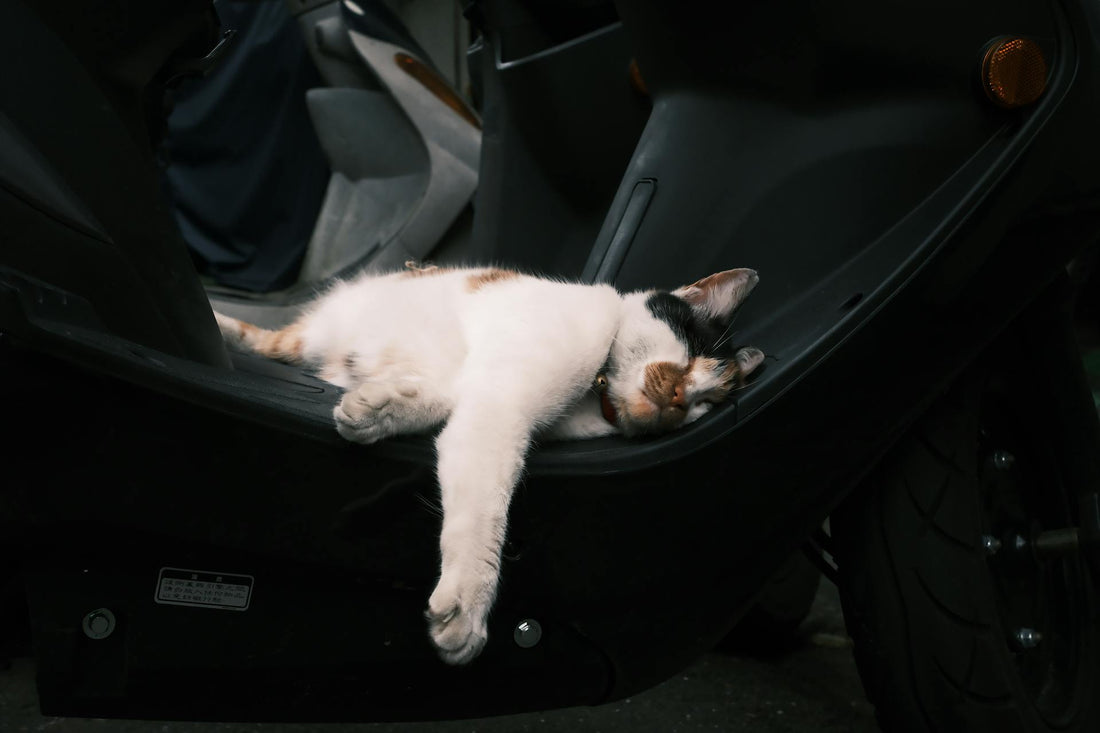
Why Does My 4-Month-Old Kitten Purr So Much? Decoding the Rumbling Mystery
Share
Introduction: The Purr-fect Mystery
Kitten’s constant purring seem like a love song — so adorable that melts your heart! Most of us are told that purring often means joy, however, it can also signals stress or health problems.

II. Decoding the Purr: Understanding Kitten Vocalizations
Purring is just one piece of your kitten’s communication toolkit. Here’s how to interpret their other noises:
Meows: Directed at humans for food, attention, or a clean litter box. A short meow is a greeting; a long, loud one signals distress.
Chirps/Trills: Feels excited while playing (even with a toy mouse!) or stalking prey.
Hisses/Growls: Warning signs of fear, pain, or territoriality. Give space if you hear these.
III. Why Do Kittens Purr? The Many Meanings
A. Contentment & Bonding
When your kitten purrs while napping in their extra large stainless steel litter box, they’re expressing pure joy. This rumble often accompanies relaxed body language like slow blinking and kneading. Purring also strengthens social bonds—kittens start purring days after birth to connect with their mothers.
B. Stress & Self-Soothing
Anxious purring might sound like a motorboat. It triggers when vet visits, loud noises, or changes in routine. To ease stress:
▶ Provide a quiet, private space with a corner cat box.
▶ Use a carbon filter litter box to minimize odors that worsen anxiety.
C. Healing & Pain Relief
Studies have found that the low-frequency hum of a cat’s purr—which ranges between 25 and 150 Hz—may actually help speed up bone repair and ease discomfort. For example, if your kitten starts purring nonstop after a fall or spay surgery, keep an eye out for other red flags like low energy or a lack of appetite.
D. Attention-Seeking Behavior
Kittens are quick learners when it comes to getting attention. If your little one loudly purrs during mealtime or play sessions, they’re basically saying, “Hey, look at me!” To discourage this habit, reward them with treats when they stay calm instead of resorting to excessive noise.

IV. The Science of Purring
The soft rumble we call a purr starts with tiny, fast muscle movements in a cat’s throat—specifically the larynx. This sound gets amplified by a small bone called the hyoid, which is located right under their chin. Interestingly, this whole process works similarly to how humans produce speech, but only cats use it to communicate. While we humans find purring incredibly calming, cats might also hum this way to unwind during stressful situations like vet visits or loud storms.
V. When to Worry: Purring Red Flags
Excessive purring paired with these signs signals a vet visit:
▶ Hiding for >24 hours
▶ Refusing food/water
▶ Diarrhea or changes in litter box habits
▶ Vocalizing excessively at night
Hyperthyroidism, respiratory issues, or urinary tract infections (UTIs) can cause abnormal purring. A vet can rule out serious conditions.

VI. Creating a Purr-Friendly Environment
A. Litter Box Setup Tips
Size Matters: Opt for a Maine Coon-sized litter box (at least 28"x20"x12") to prevent territorial disputes.
Material Matters: Stainless steel cat litter pans resist odors and stains better than plastic.
Location Matters: Avoid high-traffic zones (e.g., laundry rooms). A window cat litter box with a view can soothe anxious cats.
B. Stress Reduction Strategies
Enrichment: Provide scratching posts, tunnels, and interactive toys to keep kittens mentally stimulated.
Safe Spaces: Use a cat condo with litter box for multi-cat households or a portable litter pan for travel.
VII. CattyKasa Stainless Steel Litter Box: A Game-Changer
This product seamlessly blends functionality and style:
3-in-1 Design: Open, semi-enclosed, or odor-filtering modes.
Air Purification: Removes 93% of allergens and reduces ammonia smells by 30%.
Eco-Friendly: Durable and recyclable—no more plastic waste!
Real-World Test: One owner reported 80% less litter tracking with CattyKasa’s step-off grate compared to traditional boxes.

IX. FAQs: Your Purring Questions Answered
Q: Why does my kitten purr while avoiding the litter box?
A: Stress, dirty litter, or wrong box placement. Clean the box daily and try a large sifter for easier scooping.
Q: Can I use a stainless steel cat box for guinea pigs?
A: Yes—its nonporous surface prevents odors and is easy to clean.
Q: How often should I replace litter box liners jumbo?
A: Daily for hygiene, especially if your kitten has sensitive skin.
Embracing the Purr
Your kitten’s purr is a window into their world—whether they’re content, stressed, or healing. By addressing environmental needs and using products like CattyKasa’s odor-free litter boxes, you can foster a happier, healthier home. Remember: a purring kitten isn’t just cute—they’re communicating trust and love.
